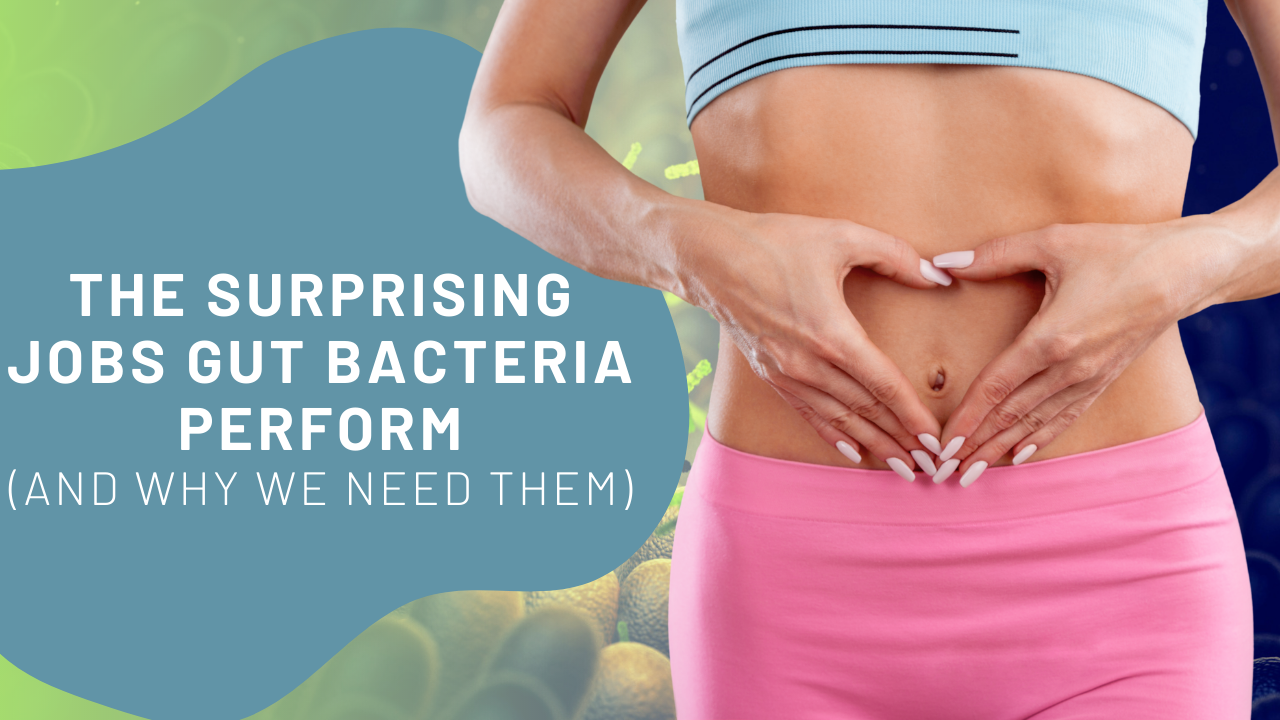|
Who knew that tiny gut bacteria could have such big jobs? They help us digest our food, produce vitamins, and protect us from harmful invaders. And when they're not doing all of that, they can even make us feel happier or more relaxed! Read on to learn more about the surprising things gut bacteria do for us (and why we need them). Stay tuned – it's going to get a little science-y! We all know bacteria can be bad for us – causing everything from acne to pneumonia. We hear a lot about gut bacteria these days and that we should be looking after it. But why? And what does it do? I think it's important to point out that we have different types of bacteria. Beneficial and commensal bacteria - These are the most important and most abundant in your gut or that are found in healthy individuals. They live in the intestines and help us digest food. These bacteria also help protect the host from disease-causing bacteria. On the other hand, the host provides the commensal bacteria with food and a stable environment. The most studied is the lactobacillus. Pathogenic bacteria - There are different types of gut bacteria, and some of them are pathogenic, meaning they can cause infection. Salmonella is one type of pathogenic bacteria that can cause food poisoning. When these bacteria get into food, they can multiply and cause symptoms like vomiting and diarrhea. Pathogenic bacteria can also cause other infections, like urinary tract infections. While most gut bacteria are harmless, it's important to be aware of the different types of bacteria that exist and how they can affect our health. Potentially pathogenic bacteria or pathobionts. - The human gut is home to a variety of different bacteria, many of which play an important role in keeping the digestive system healthy. However, some types of bacteria, known as pathobionts, have the potential to cause problems if they are allowed to overgrow. Prevotella is one example of a pathobiont that is normally present in low numbers in the gut. However, if this bacteria is allowed to overgrow, it can trigger autoimmune disease. While pathobionts can cause problems if they are allowed to flourish, they are not necessarily "bad" bacteria. Many pathobionts play an important role in keeping the gut microbiome balanced. Therefore, labeling all pathobionts as bad is too simplistic and does not reflect the complex role that these bacteria play in human health. When the bacteria are in good shape and well balanced, they help us with several important jobs.
Our bodies have genes that help us digest carbohydrates. Humans have 17 of these genes. Our microbiome has thousands of genes that help us digest fiber. This means that we can eat carbohydrates as long as we have the right types of bacteria in our gut.
Short-chain fatty acids are used as fuel by cells in the gut. This helps to reduce the growth of harmful bacteria. They also help with the absorption of minerals like zinc, magnesium, and iron. Additionally, they play a role in gene expression and DNA replication. Some scientists think that short-chain fatty acids might also help protect the brain from damage and promote its growth.
In addition to aiding in the digestion of food, the gut microbiota produces important nutrients, such as vitamin K and some B vitamins. They also enhance the availability of other nutrients, such as iodine. One of the most important jobs of balanced gut microbiota is to synthesize vitamins and other nutrients that the body needs to function properly. Without these vital micronutrients, we would quickly become ill.
70% of the immune system is gut-based. Bacteria will form a barrier function by creating a mucosal layer, which stops pathogens from entering the bloodstream. They also stimulate the immune system within the gut lining.
This is because they're essential in the process of making and metabolizing neurotransmitters. There is an estimated 95% of serotonin is produced within the gut. This is only done through the assistance of bacteria that stimulate the cells that produce serotonin. Serotonin is our happy hormone. Then, there is also the GABA (Gamma-aminobutyric acid) neurotransmitter. This is produced directly by lactobacillus and bifidobacterial. GABA is a calming neurotransmitter. We could always do with a bit of extra calming, can’t we?
The bacteria can detoxify some of the toxic substances that are found within your food. They also help eliminate waste, toxins, and hormones from the body via the stool.
Gut bacteria can influence how thyroid hormones are converted in the gut. This happens with help of bile acids, which also influence how estrogen moves through the system. Estrogen passes through the gut and is eliminated through the stool. When there is an imbalance of bacteria, it may mean that some bacteria aren't working correctly and estrogen is being recycled back into the system, which can cause estrogen dominance. We’ve only scratched the surface of all the amazing things gut bacteria do for us. From keeping our immune systems strong to helping us digest food and absorb nutrients, to protecting us from harmful toxins and pathogens, these little guys are constantly working hard to keep us healthy. It’s no wonder we’re starting to realize just how important they are and that we need to take care of them! If you want to learn more about your gut microbiome or find out how it could be affecting your health, schedule a free discovery call with one of our experts today. We can help you figure out what steps you need to take to get your gut bacteria back on track so they can continue doing their amazing jobs! If you haven’t joined our Private Facebook Group, please do HERE If you’re looking for a more natural way to manage your health, please contact us for a discovery call to see if our approach would be appropriate for your situation. DISCLAIMER: The information in this email is not intended nor implied to be a substitute for professional medical advice, diagnosis or treatment. All content is for general informational purposes only and does not replace a consultation with your own doctor/health professional
0 Comments
Leave a Reply. |
Archives
November 2023
Categories |

